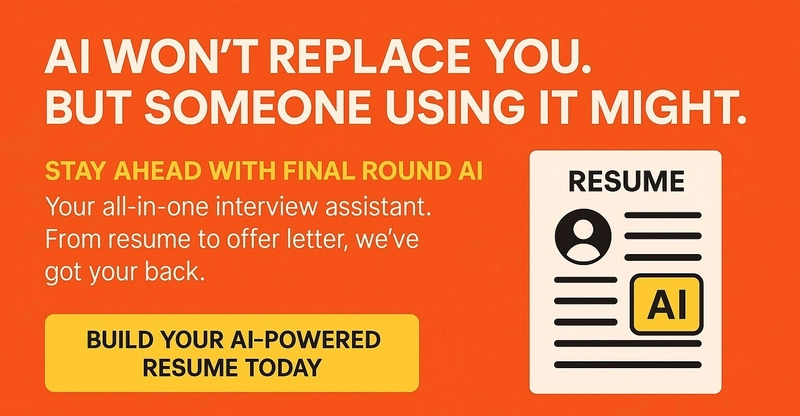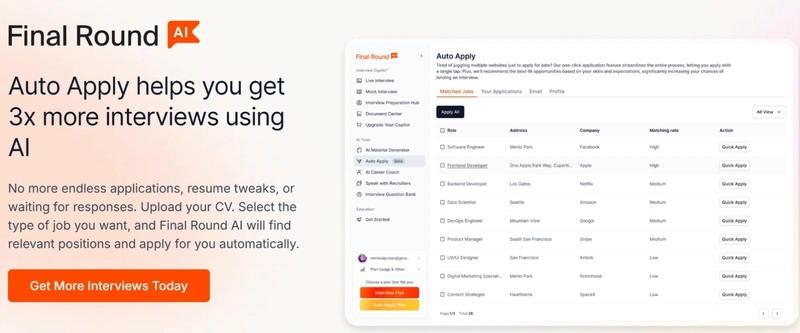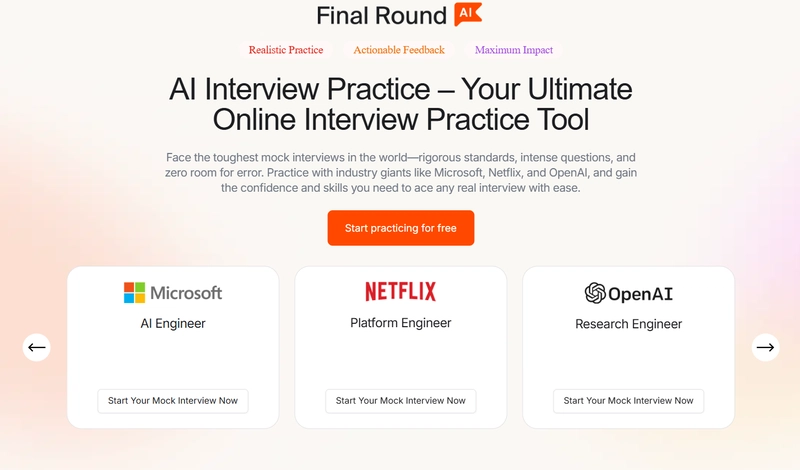When it comes to landing your dream job, nailing the technical questions is only half the battle. Today, most employers are just as interested in how you handle real-world challenges, work with others, and grow from experience. That’s where behavioral interview questions come in. Mastering these questions not only helps you stand out from other candidates, but also proves that you’re ready to thrive in any workplace environment. Here are the top 30 behavioral interview questions to help you stand out and feel confident. 💪🏻
Let’s dive in! 🔥
30 Behavioral Interview Questions With Smart Answers
1. 🧠 Tell me about a time you had to deal with a difficult coworker.
Interviewers want to see how you manage conflict and maintain professionalism. A poor response could signal a lack of emotional intelligence or teamwork.
Answer:
In a previous job, a team member often missed deadlines, which impacted our project delivery. Instead of escalating immediately, I scheduled a one-on-one coffee chat to understand their side. I learned they were overwhelmed with tasks, so I helped redistribute the workload and also suggested we communicate timelines better. After that, we collaborated smoothly, and the project finished on time. ☕
2. 🕒 Describe a time when you were under a lot of pressure. How did you handle it?
This reveals your stress management skills and ability to prioritize under pressure, a key trait in dynamic roles.
Answer:
During our product launch, a bug was discovered the night before go-live. I stayed calm, coordinated with the QA and development teams, and we pushed a patch within hours. I also kept stakeholders informed with regular updates. The launch was a success, and we even got kudos from the client. 🚀
3. 📅 Give an example of a goal you set and how you achieved it.
Employers want to understand how you approach goal-setting, planning, and follow-through.
Answer:
I wanted to become a certified Scrum Master within six months to support my team better. I broke the process into phases: weekly study sessions, mock exams, and a mentorship chat every two weeks. I passed the exam in five months and implemented agile practices that improved team velocity by 20%. 📈
4. 🧩 Tell me about a mistake you made and what you learned from it.
They’re evaluating humility, accountability, and learning from failure, crucial to personal and professional growth.
Answer:
Once, I misunderstood a client's requirement, which led to redoing a module. I immediately owned the mistake, apologized, and involved the client directly in future check-ins to avoid gaps. Since then, I've always clarified expectations early and triple-checked specs. ✅
5. 🤝🏻 Describe a situation where you had to work closely with someone very different from you.
This tests adaptability, communication skills, and your openness to diversity and inclusion.
Answer:
I partnered with a colleague from another department with a very analytical, data-heavy approach, while I'm more creative. Initially, our perspectives clashed. But over time, we respected each other’s strengths and learned to merge data-driven insights with creative strategies. Our joint campaign boosted engagement by 30%. 📊

Try Final Round AI for FREE today! 🔥
6. ⏳ Tell me about a time you had to meet a tight deadline.
This gauges your time management, ability to work under pressure, and organizational skills.
Answer:
We had three days to finalize a client proposal after a last-minute request. I quickly delegated tasks, created a shared timeline, and held daily check-ins. We delivered the proposal early, and the client appreciated our responsiveness, awarding us the project. ⏰
7. 🎯 Have you ever had to motivate others? What did you do?
Leadership isn't just for managers. They’re checking for influence and team spirit.
Answer:
During a long and tedious project phase, morale dipped. I organized informal weekly check-ins with fun themes, acknowledged wins (big and small), and shared the 'why' behind our efforts. This renewed motivation helped us complete the phase ahead of schedule. 🎉
8. 🧮 Give an example of a decision you made that wasn't popular and how you handled it.
Shows integrity, decision-making confidence, and how you handle resistance.
Answer:
I chose to switch project tools midstream, which was initially met with pushback. I explained the long-term benefits clearly, offered training, and listened to concerns. Once the team got used to it, productivity improved and errors reduced significantly. ⚙️
9. 💬 Describe a time you had to explain a complex concept to someone.
This checks communication and teaching skills, especially useful in cross-functional teams.
Answer:
I explained machine learning basics to our sales team using relatable metaphors. Instead of technical terms, I compared the algorithm to a chef learning recipes over time. They appreciated the clarity, and it helped them pitch the tech more effectively. 📚
10. 🔄 Tell me about a time you had to adapt to a major change.
Companies want people who are flexible and resilient when priorities or processes shift.
Answer:
When our team was restructured, my role expanded overnight. I embraced the change by quickly upskilling and initiating regular syncs with my new team. It not only helped us transition smoothly but improved cross-team collaboration. 👩🏻🤝🧑🏻
11. 🔍 Tell me about a time you identified a problem and came up with a creative solution.
Employers want to assess your problem-solving mindset and how you approach challenges proactively and innovatively.
Answer:
At my previous company, our onboarding emails had low engagement. Instead of sticking with the same format, I proposed using interactive content with gamified checklists. We saw a 45% increase in click-through rates within a month, and new hires reported a more enjoyable experience. 📬
12. 🧭 Describe a situation where you had to make a decision without all the information you needed.
This tests your decision-making ability under uncertainty, something every professional encounters.
Answer:
While leading a client campaign, we were waiting on key demographic data. Instead of stalling, I used previous campaign patterns and market assumptions to build a draft plan. Once the data arrived, only minimal tweaks were needed. The campaign was a success. 📉
13. 👥 Tell me about a time when you had to collaborate with a difficult team member.
Your ability to work with all personality types is essential for healthy team dynamics.
Answer:
I once worked with a teammate who often dismissed ideas. Instead of reacting emotionally, I invited them to co-present a strategy session. This gave them ownership and encouraged collaboration. Over time, they became more open and the team vibe improved. ✨
14. 🏆 Describe a project you're proud of and your contribution to its success.
They want to hear about a moment of ownership, initiative, and impact.
Answer:
I led the redesign of our internal knowledge base, which reduced ticket volume by 30%. I gathered feedback, mapped out a new structure, collaborated with tech writers, and ran user tests. It improved efficiency across departments. 🎯
15. 🔁 Tell me about a time you received critical feedback. How did you handle it?
Demonstrates your receptiveness to growth and emotional intelligence.
Answer:
A manager once pointed out that I dominated meetings too much. Though surprised, I thanked them and began consciously inviting others to speak. I even started rotating facilitation duties. The feedback improved my leadership and team trust. 🗣️
16. 🛠️ Describe a time you went above and beyond your job description.
This uncovers your initiative and willingness to take extra steps when needed.
Answer:
While working in customer support, I noticed recurring complaints about a bug. I compiled logs, wrote a brief report, and handed it to the dev team. They fixed it, and customer satisfaction went up. My manager praised my initiative during our quarterly review. 📋
17. 🧘 Tell me about a time you had to remain calm in a stressful situation.
Being level-headed under pressure is crucial in fast-paced environments.
Answer:
During a live demo, the app crashed. I remained calm, switched to a pre-recorded backup, and continued engaging with the audience. Post-demo, I addressed the issue openly and gained even more trust from the client for being composed. 💼
18. 📚 Describe a time you had to learn something quickly.
Your ability to learn on the fly indicates adaptability and growth potential.
Answer:
When we switched to a new project management tool, I volunteered to lead the transition. I watched tutorials, read the manual, and became proficient in two days. I then created a mini onboarding guide for the team. ⚡
19. 📢 Tell me about a time when you had to advocate for your idea.
They want to see that you can communicate persuasively and back your ideas with logic.
Answer:
I proposed automating a manual reporting task that consumed hours weekly. Initially, there was hesitation. I presented a prototype and showed potential time savings. The idea was approved, and the automation saved 15+ hours per month. 📊
20. 🏁 Tell me about a time you had to meet a long-term goal. How did you stay motivated?
Tests perseverance, goal-setting, and intrinsic motivation.
Answer:
While preparing for my PMP certification, I studied consistently for four months. I broke the syllabus into weekly goals and kept a visual progress tracker. Celebrating mini-milestones kept me motivated. I passed on my first try. 📆
21. 🧾 Describe a situation where attention to detail was essential.
Accuracy matters in many roles. This question helps determine how careful and thorough you are.
Answer:
While finalizing an investor report, I noticed a misalignment in revenue projections. I re-checked all formulas and found a mislinked cell in our Excel sheet. Fixing it saved us from presenting inaccurate numbers. 📈
22. 🌍 Tell me about a time when you worked with a team from a different culture.
Shows your ability to work in diverse environments and respect global perspectives.
Answer:
During a joint project with our Japan office, I adapted to their communication style and took time zone differences seriously. By showing cultural sensitivity and flexibility, we built trust and completed the project seamlessly. 🌐
23. ⛔ Have you ever had to say 'no' at work? How did you do it?
Tests assertiveness and your ability to balance workload or maintain quality.
Answer:
A colleague asked me to take on extra tasks during a critical deadline. I respectfully declined, explaining my current priorities. Instead, I helped them reassign the task and offered support once my work was done. 🚫
24. 🗓️ Tell me about a time when your planning skills were put to the test.
Planning and time management are crucial to project success.
Answer:
For a product launch, I created a detailed roadmap, including backup plans and buffer times. Midway, we hit a vendor delay, but because of built-in contingencies, we stayed on track. The launch was seamless. 🚀
25. 🧗 Describe a time you had to push yourself outside your comfort zone.
Growth comes from discomfort. This question reveals your courage and self-awareness.
Answer:
Public speaking terrified me. So I volunteered to lead a company-wide workshop. I practiced rigorously, sought feedback, and finally delivered it confidently. It was a turning point for me. 🎤
26. 🎓 Tell me about a time when you had to mentor someone.
Leadership is about lifting others. This shows your ability to guide, coach, and inspire.
Answer:
I mentored a junior analyst who struggled with data visualization. I created a step-by-step guide, set weekly review sessions, and encouraged experimentation. Within three months, they were leading presentations. 💬
27. ⚖️ Describe a time you had to balance multiple priorities.
Demonstrates your ability to multitask and stay organized.
Answer:
During year-end close, I had to handle financial audits, team training, and client meetings. I blocked time for deep work, delegated wisely, and updated stakeholders transparently. All goals were met without burnout. ⏱️
28. 🧯 Tell me about a crisis situation and how you managed it.
They want to know if you can remain effective and calm during emergencies.
Answer:
A website outage hit during a major campaign. I coordinated with IT, informed clients proactively, and managed the social response. We resolved the issue within hours and retained customer trust. 👷🏻♂️
29. 🚀 Describe a time when you improved a process or workflow.
This reveals how you contribute to continuous improvement.
Answer:
Our approval process for expense reports took days. I proposed a streamlined form with automated routing. After implementation, approvals dropped from 3 days to 6 hours. 📲
30. 🎙️ What’s the most challenging communication situation you’ve faced?
Communication is critical in every role. This uncovers how you handle difficult conversations.
Answer:
I had to inform a vendor that we were ending our contract due to quality issues. I prepared a professional script, emphasized appreciation, and offered constructive feedback. They thanked us for the respectful handling. 📞
🎉 Final Thoughts
Behavioral interview questions aren’t just hurdles to clear, they’re golden opportunities to showcase your growth, mindset, and potential. 🧠 By preparing thoughtful stories and reflecting on your past experiences, you empower yourself to walk into any interview with confidence and clarity.
Remember, the goal isn’t to have a “perfect” answer, it’s to be authentic, self-aware, and solution-focused. 🔥
| Thanks for reading! 🙏🏻 Please follow Final Round AI for more 🧡 |
|---|








Top comments (17)
This was a really practical and useful article!
Behavioral questions truly are decisive in interviews, and the sample answers help a lot with better preparation.
Thanks for the great summary and the motivational tips at the end 👏🔥
Thank you so much! 🙏🏻 I'm really glad you found the article practical and useful. Behavioral interviews can definitely make or break an opportunity, so it's great to hear the examples helped with your preparation. Wishing you all the success and confidence in your upcoming interviews. And thank you for taking the time to leave such encouraging feedback 🙌🏻
🙏🙏🙏
yeah tbh behavioral questions always trip me up way more than technical stuff, so seeing all these real examples is actually kinda nice - you think prepping answers ahead like this makes you come off more natural, or does it kill the vibe in the room?
Totally get you, behavioral questions can definitely be trickier than technical ones because they catch you off-guard if you’re not ready. I’ve found that prepping ahead actually makes you sound more natural, not less! It’s like muscle memory, you’re not memorizing a script, just getting comfortable with your own stories. That way, when the pressure’s on, you’re not scrambling, you’re connecting.
Thanks for sharing your thoughts, really appreciate the perspective! 🙏🏻
Pretty cool seeing these all in one spot - way less stressful when you’ve really spitballed your stories ahead of time.
Absolutely! Having everything in one place does make it so much easier to prep without the last-minute scramble. Spitballing your stories ahead of time is such a power move, you’re setting yourself up for success!
Thanks a lot for reading and dropping by with your thoughts 🙏🏻🙏🏻
Thank you for sharing this great article
You're welcome 🙏🏻🙏🏻
Such a solid roundup - having real examples for each question makes it way less intimidating to prep for interviews. Do you have a favorite behavioral story you always keep in your back pocket?
Thank you so much! 🙏🏻 I totally agree, real examples really help take the pressure off and make prep feel more doable. And I love that question! I actually do keep a favorite story handy, one that shows how I handled a high-stress situation with tight deadlines and turned it into a success. It’s super versatile and easy to adapt for different questions. How about you, do you have a go-to story you like to keep in your back pocket?
thanks for shearing
You're welcome 🙏🏻🙏🏻
This article is pure gold 💎 Thank you so much for putting all these important questions in one amazing article 🙏
You're welcome 🙏🏻🙏🏻
This is so helpful, keep up the good work Hadil. 😁
Thank you Muskan! I'm so glad you found it helpful 🙏🏻